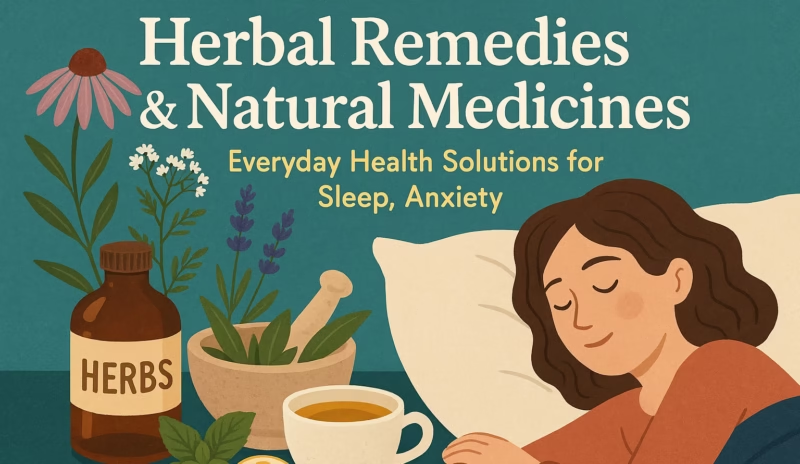Herbal Remedies & Natural Medicines: Everyday Health Solutions for Sleep, Anxiety
A few months ago, I was lying in bed—lights off, phone on silent—but my mind zig‑zagging through every worry: bills, work, that weird thing I said in that meeting. Ever feel like your brain buzzes at night?
Well, I did too. So, I pulled out chamomile tea, diffused lavender oil, tried some valerian root supplements. That little ritual didn’t just relax my muscles—it slowed down my thoughts and helped me drift off faster than caffeine ever could.
That got me thinking: there has to be more to herbal remedies and natural medicines than just folklore. Because if they can help me, they might help you too.
What Exactly Are Herbal Remedies and Natural Medicines?
Let’s keep it simple. Stuff like chamomile, lavender, or ashwagandha that your grandma probably swore by. Then there’s natural medicines — a bigger umbrella that includes herbs plus minerals and other natural supplements that can support your health:
- Herbal remedies: Herbal remedies are basically when you use parts of plants — flowers, leaves, roots — to help your body feel better.
- Natural medicines: If herbal remedies are plants, natural medicines might be plants and more.
The idea is less about synthetic pills and more about nature’s pantry.
Where They Help: Sleep & Anxiety
Many of us in the us deal with tossing and turning, stress, and anxiety. Whether it’s work stress, parenting chaos, or just too much screen time, our bodies don’t always know how to shut down. Here’s what herbs and natural medicines may do:
- Valerian root, chamomile, lavender, and passionflower are often used as natural sleep aids. While results vary, Studies are mixed, but some show they help you fall asleep faster and reduce waking up at night.
I love brewing chamomile tea before bed — it’s my way of telling my brain, “Hey, slow down, buddy.” And anxiety? Ashwagandha and lemon balm, on the other hand are my go-to herbs to help chill those nerves. Some folks swear they lower stress hormones and help keep panic at bay, which sounds pretty good to me. Just a heads up, though:
- if your anxiety is serious, these remedies are more of a helpful sidekick, not a replacement for professional care.
Also, for sleep and anxiety herbs, check out the Mayo Clinic’s guide on herbal treatments for anxiety. They provide evidence-based info that’s super helpful when you want to know what’s safe and effective.
Herbal Remedies for Infections — Specifically Tooth Infections
Now, shifting gears to something painful: toothaches, infections. Natural antibiotics, herbal pain relief—it’s something people often ask about.
I’m not a dentist, but I’ve read enough to say some natural antibiotics for dental care and tooth infection can ease pain and fight bacteria a little while you wait for professional help.
- Clove oil: Clove oil is the classic go-to and it got this stuff called eugenol that actually numbs pain which can fight the germs messing with your tooth. It’s good for temporary relief around an infected tooth.
- Garlic: Crushed garlic has been known for antibacterial effects. It may help against Streptococcus mutans (a bacteria involved in cavities) along with other herbs.
- Aloe vera gel, echinacea, goldenseal: It’s used in some herbal dental products or traditional formulas to soothe gums, reduce inflammation. There’s some clinical trial support. for these too.
If you’re curious about how garlic and other herbs fight tooth bacteria, this detailed study on natural antibacterial agents gives some great insights into the science behind those home remedies.
Be careful: But here’s the no-nonsense part: if your tooth infection is swelling or causing fever, don’t wait around with just herbs — get to a dentist ASAP.
What to Watch Out For: Dosing, Side Effects, & Quality
- Some natural antibiotics/herbs can irritate tissue or upset digestion.
- Using them short term is safer. Long term use needs more research.
Putting It Into Practice: What I Do (and What You might Try)
- A few deep breaths, walking. Herbal support with lifestyle.
- Tooth/gum discomfort: clove oil + saltwater rinse; if it’s mild. I keep garlic in my kitchen (fresh, organic) and sometimes chew a clove when nothing else around. But always plan a dentist appointment.
What the Research Says (in a Nutshell)
- Natural sleep aids are common among adults in many studies–even though the evidence is sometimes modest.
So yes: there is science behind some of this. But also: not enough in many cases to say “this works for everyone.”
Encouragement
Dealing with anxiety. Struggling to sleep. That throb of a tooth that won’t quit. It’s draining. But trying herbal remedies and natural medicines can feel empowering, because they’re things you can often control. And even small wins count, notice how your body responds. If it gives you just a bit more ease, that’s a win.
Remember: you deserve rest. You deserve relief. And if you try something herbal (or natural) tonight, drop me a comment—I’d love to hear what helped (or didn’t).
